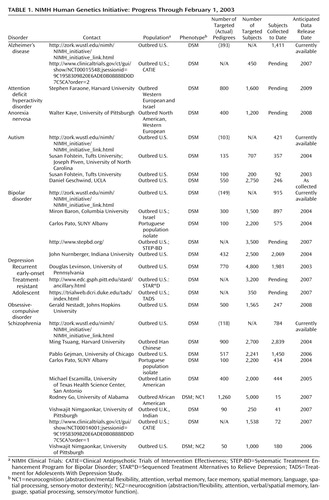NIMH Human Genetics Initiative: 2003 Update
Given the major public health implications of identifying genes that produce vulnerability to mental disorders, the National Institute of Mental Health (NIMH) launched in 1989 a broad and multifaceted human genetics initiative to collect sets of families containing multiple affected individuals. The primary goal of this initiative was to establish for use in genetic studies of mental disorders a national scientific resource of DNA extracted from immortalized cell lines and clinical information, which in turn would be broadly distributed to qualified investigators in the scientific community.
Progress in scientific understanding is best achieved by the free and open exchange of knowledge, data, and ideas (1). The NIMH Human Genetics Initiative was founded on the principle that timely access to primary data and biomaterials for human genetic research may stimulate research and development, thereby maximizing the benefits afforded to individuals affected with these disorders and their family members. Progress in these efforts is paralleled by growing interest throughout the scientific community in having timely access to the information and resources that accelerate understanding of disease etiology, refinement of diagnostic systems, and development of novel therapeutic agents and preventive interventions.
The initial focus of this initiative was on schizophrenia, bipolar disorder, and Alzheimer"s disease. Pedigree ascertainment by three multisite projects was supported from 1991-1998. In 1998, NIMH issued a Request for Applications (MH-98-010) to solicit applications for collaborative research projects to collect large pedigree samples and conduct molecular genetic analyses on schizophrenia, bipolar disorder, and early-onset recurrent unipolar depression. Another solicitation (MH-99-005) issued later that year focused on schizophrenia and early-onset recurrent depression. NIMH funded under these RFAs three projects on schizophrenia, two on bipolar disorder, and one on early-onset recurrent depression in order to augment existing resources in the NIMH Human Genetics Initiative.
Table 1 shows the data sets currently included in the Human Genetics Initiative. Data and DNA are currently distributed from the three projects in which pedigrees were collected from 1991-1998 (rows 1, 9, and 18), as well as one autism project (row 5). As of February 1, 2003, nearly 27,000 DNA samples and over 340 cell lines from these projects have been distributed to 96 teams of investigators in academia (N=76), biotechnology companies (N=11), and pharmaceutical companies (N=9). To date, over 400,000 genotypes have been generated from these data sets, and are available for distribution. Further information is available at http://zork.wustl.edu/nimh/NIMH_initiative/NIMH_initiative_link.html.
Additional projects on these and other disorders have been included in the initiative. Blood collection for cell line immortalization and DNA extraction for future genetic studies are currently being supported in four large multisite NIMH clinical trials on schizophrenia, Alzheimer’s disease, bipolar disorder, treatment-resistant depression, and adolescent depression. These efforts ultimately will facilitate pharmacogenetics studies of therapeutic drug response in these patient populations.
The statistical power afforded by the combined data sets across different disorders is expected to facilitate the discovery of genes producing vulnerability to mental disorders. NIMH is currently exploring various options for continued growth and enrichment of this scientific resource for future studies on the genetic basis of mental disorders.
 |
Address reprint requests to Dr. Moldin, Genetics Research Branch, Division of Neuroscience and Basic Behavioral Science, NIMH, 6001 Executive Blvd., Room 7189, MSC 9643, Bethesda, MD 20892-9643; [email protected] (e-mail).
1. Campbell EG, Clarridge BR, Gokhale M, Birenbaum L, Hilgartner S, Holtzman NA, Blumenthal D: Data withholding in academic genetics: evidence from a national survey. JAMA 2002; 287:473-480Crossref, Medline, Google Scholar



